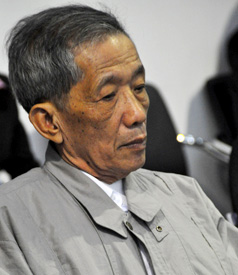Phnom Penh, Cambodia – In the first verdict at the UN-backed war crimes tribunal, the Khmer Rouge’s chief executioner has been found guilty of war crimes and crimes against humanity.
Kaing Guek Eav, better known by his nom de guerre, “Duch,” ran the notorious S-21 prison where as many as 17,000 people were tortured before being killed.
“Every individual detained within S-21 was destined for execution in accordance with the Communist Party of Kampuchea policy to ‘smash’ all enemies,” according to a summary of the judgment read to the courtroom by Nil Nonn, the tribunal’s president.
The judgment also noted that “at least 100 S-21 detainees died after being bled to death by the S-21 Medical Unit.”
In all, the Khmer Rouge regime is blamed for the deaths of as many as 2 million people during its rule from 1975-1979. Many were worked to death or died from starvation, disease, or execution.
Duch received a 35-year sentence for his role in Khmer Rouge killings, but judges reduced it to 19 years in lieu of time served since 1999, when he was discovered living under a pseudonym in the Cambodian countryside and imprisoned. Cambodia has no death penalty.
This means the spritely 67-year old could be freed at the age of 86.
Shock Over Shortened Sentence
The verdict shocked some Cambodians who think Duch should spend the rest of his life in prison. Outside the courtroom, some expressed anger with the judges’ decision.
“Anything less than 30 years is just not acceptable, it’s just not acceptable. The judges would be making light of the crimes, the atrocities of that era, of what he committed,” says Theary Seng, whose family members were murdered by the regime. “He should be receiving many life sentences, even considering the mitigating factors, because of the lives that he took.”
When considering their verdict, judges said they took into account mitigating factors including Duch’s expressions of remorse, his admission of guilt, and his cooperation with the court.
Lawyers for the prosecution, who had asked for a 45-year sentence, said they were satisfied with the court’s decision.
“It certainly provides a penalty I think the Cambodian people will appreciate,” said prosecutor William Smith. But he added that the prosecution would consider appealing for a stiffer sentence.
A Triumph for International Justice?
Duch’s defense lawyer did not speak to journalists, but he has 30 days to appeal the sentence. Some observers say that Duch will appeal, noting that he asked for acquittal at the end of his trial, arguing that he was not one of the highest-ranking Khmer Rouge officials.
“I think it is likely that we will have an appeal,” says Heather Ryan of the Open Society Justice Institute, which monitors the tribunal. “I would have a hard time seeing that on appeal he could get a shorter sentence.”
She added that the verdict proves to Cambodians that leaders cannot commit atrocities with impunity. “All in all,” she says, “I feel satisfied and sort of inspired.”
But Ms. Seng says the thought of Duch walking free in 19 years could lead Cambodians to lose faith in international justice. The United Nations-backed court overcame more than a decade of heated negotiations, delays, and wrangling to reach its first verdict, yet it is still struggling to overcome cash-shortages and allegations of corruption and political interference.
“This is the worst legacy to be left by this process – to have a society that is already cynical, that is very distrusting, to have that society further embedded in cynicism,” says Seng. “And this verdict leaves that possibility.”
Media that fights fascism
Truthout is funded almost entirely by readers — that’s why we can speak truth to power and cut against the mainstream narrative. But independent journalists at Truthout face mounting political repression under Trump.
We rely on your support to survive McCarthyist censorship. Please make a tax-deductible one-time or monthly donation.
